A Nonprofit Harvests Pecans, Helps Veterans
3SA for Veterans, a non-profit in San Angelo, uses a pecan orchard to help vets find community, support, and employment.
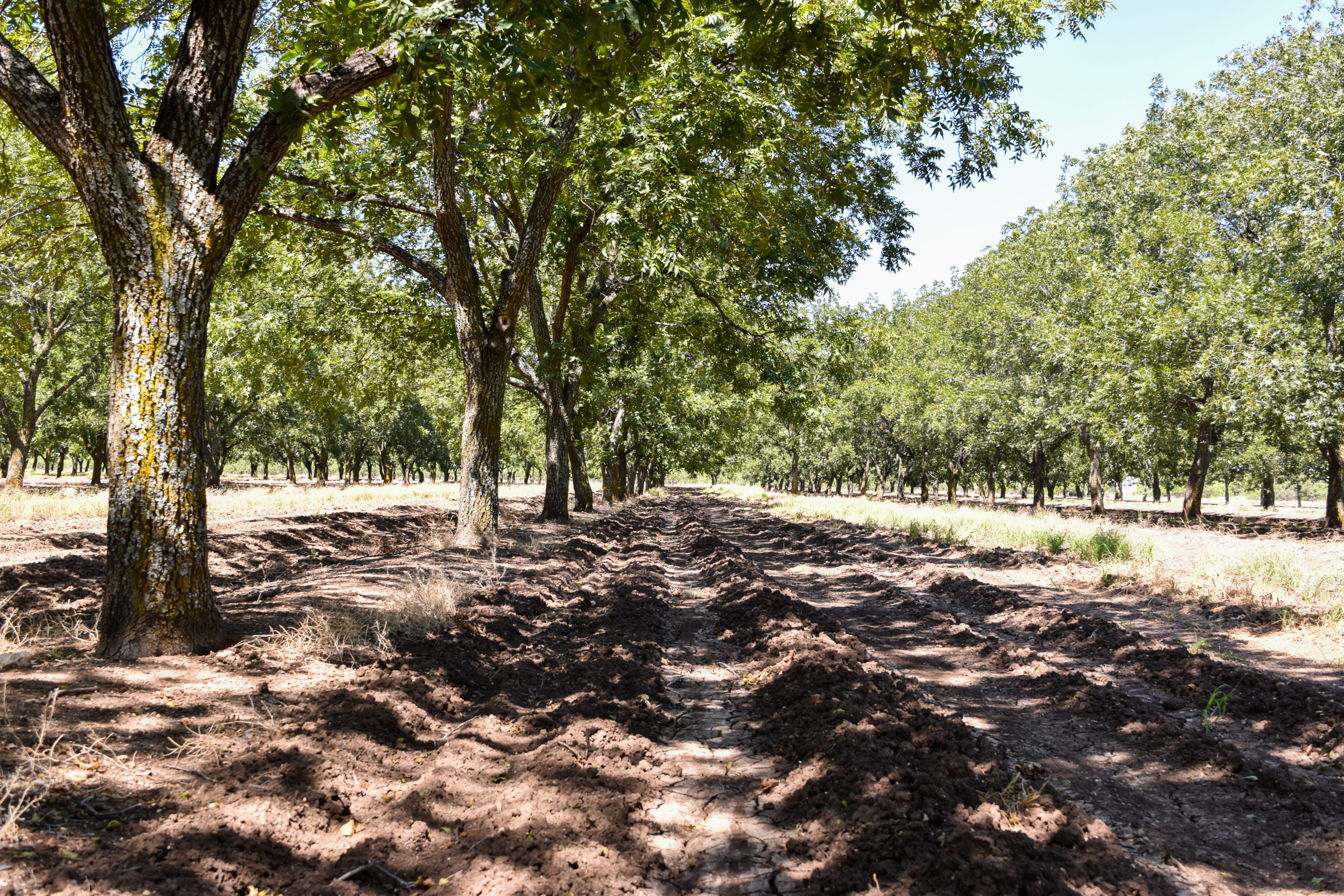
3SA for Veterans plans to use this 42-acre pecan orchard to provide employment opportunities to veterans. (Photo by Catherine Clark)
Superior Solutions and Services in Aging for Veterans, or 3SA for Veterans for short, is a 501(c) nonprofit charity in San Angelo, Texas, that helps local veterans navigate housing, employment issues, and the U.S. Veteran Affairs Department (VA). The organization was founded in December 2014 by Dr. Charles Ewing, a retired Chief Hospital Corpsman in the Navy, and Dr. David Sanders, a civilian who always longed to serve but couldn’t due to collapsed discs in his back.
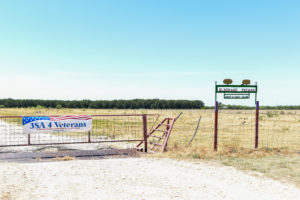
The 3SA for Veterans sign hangs on the gate at the front of their pecan orchard in Eldorado, Texas. (Photo by Catherine Clark)
Ewing and Sanders met while getting their doctorates in gerontology, the multidisciplinary study of aging and older adults. The two men shared their concerns for veterans with disabilities who often feel forgotten and left behind.
According to the U.S. Census Bureau’s 2020 American Community Survey Report, out of the approximately 18 million veterans living in the United States, 25 percent have a service-connected disability, which is an injury, disease, or disability that active duty either caused or aggravated. Another 30 percent of veterans report having an “ACS-defined disability,” which differs from service-connected and includes “difficulty with vision, hearing, mobility, cognitive functioning, independent living, and self-care.” These percentages represent only the veterans who reported a disability rating in the survey.
“It’s the whole community’s responsibility to take care of these veterans afterward. They did their time, and now it’s our turn to help them,” Sanders explains.
Recognizing a need, Sanders and Ewing decided to act. They pulled together their savings and started 3SA for Veterans by purchasing and remodeling a 4-bedroom house in San Angelo.
Through the nonprofit, Ewing and Sanders continue to buy and renovate homes to help veterans with disabilities live with independence and dignity. This May, the group took their mission even further, and Ewing purchased a pecan orchard in Eldorado. With this new property, they plan to create a space where veterans can farm pecans, live, and find other employment opportunities.
“We’re trying to give them someplace to go to do something besides sit and ponder,” Ewing says.
For the past six years, the organization has worked to get their house recognized by the VA as a Medical Foster Home Program, while also fundraising to purchase more homes and create more opportunities. Ewing was, unintentionally, the first founding vet of 3SA for Veterans.
“I was a Navy Corpsman, which means 90 percent of the time you are assigned to the Marines. For 13 years, I played with the Marines, too,” Ewing explains. In his 26 years with the Navy, he patched his fellow soldiers back up and provided medical support. During his service, Ewing retained hardware in both shoulders and injured his knee from active duty.
Those adhesions caused blood to clot around the injuries and eventually travel to his brain, resulting in a stroke on Dec. 24, 2014. And just like that, Ewing found himself needing the kind of support he was working to give other vets. Since then, Ewing has used a wheelchair to get around and continues to undergo physical therapy to regain mobility on his left side, his dominant side. With the help of 3SA for Veterans, he has had someone to rely on while fighting with the VA to get proper medical treatment and compensation.
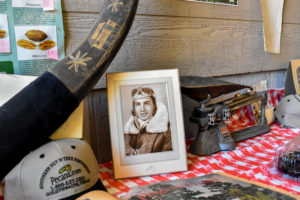
While organizing the cleaning plant, 3SA for Veterans found old photographs like this one and shared them with the Olsak family. In this photo, LeRoy Olsak is pictured in his pilot gear. (Photo by Catherine Clark)
Although he is still recovering and adapting from the stroke, Ewing has continued to work with Sanders and the 3SA for Veterans team to provide further opportunities to his fellow vets. In May 2020, Ewing purchased Olsak Pecan Orchard, planted and nurtured by the late LeRoy Olsak.
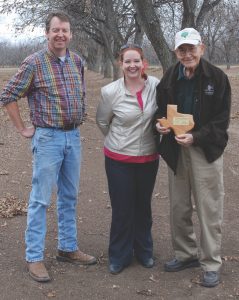
This photo was taken in December 2014. From left, Extension Specialist Monte Nesbitt, Extension agent Allison Watkins and LeRoy Olsak. LeRoy Olsak poses with his state championship award from the 2013 Texas State Pecan Show.
LeRoy Olsak was a longtime Texas pecan farmer and a World War II veteran. He planted Olsak Pecan Orchard on family land outside of Eldorado, Texas, in the 1970s after retiring. Although he only farmed 40 acres of trees, Olsak achieved the ranking as one of the best orchards in Texas and often produced state champion pecans. He served on the Board of Directors for both the Texas Pecan Growers Association and the Texas Pecan Board. Olsak passed away in October 2015, leaving his orchard to be cared for by his family and longtime farm manager, Abel Martinez.
When looking for property in Texas, specifically around San Angelo, Ewing stumbled upon the listing for Olsak Pecan Orchard in Pecan South. Now, Sanders says 3SA for Veterans hopes to carry on Olsak’s legacy and keep the pecan tradition alive.
“LeRoy was a WWII vet and planted this orchard in the early 1970s. That’s 50 years of history. We want veterans to carry on LeRoy’s legacy; we’re trying to put this into a perpetual effort, trying to get Texas to recognize this as a historical marker,” explains Sanders, 3SA for Veterans’ Chief Executive Officer.
3SA for Veterans also perpetually leases the pecan orchard to the east of the property, which is owned by Cindy Hanks, Olsak’s niece.
“I think LeRoy would be very proud of the fact that this is for veterans,” Hanks says. “Being a veteran himself, he was always pleased to help people, and I know he would be very happy that [his work] will continue on not only for veterans but also in the continuation of the orchard itself.”
Although Ewing just purchased the 164-acres of land, he and 3SA for Veterans are already preparing for their first harvest and making big plans for the future. ‘Wichita’ and ‘Western’ make up the majority of trees on the 42-acre orchard, but there are also several ‘Pawnee’ and ‘Cheyenne’ trees as well as some surprise cultivars mixed in. The property also sports grazing pastures for goats and cattle, a rafter of turkeys, some Axis deer, a small farmhouse, and a cleaning plant.
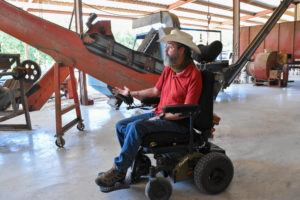
Charles Ewing, one of the founders of 3SA for Veterans, discusses the nonprofit’s plans to upgrade the orchard’s cleaning plant. (Photo by Catherine Clark)
While preparing for the first harvest, 3SA for Veterans has partnered with several companies. For instance, Wizard Manufacturing helped them upgrade parts of the small cleaning plant. Southern Nut’ n’ Tree has also helped them get new tractors and harvesters. Recently, they also received a new shaker.
Charles Ewing will be using the shaker this harvest to shake trees and collect the crop.
“We consider a tractor or shaker just a bigger wheelchair. It’s just something a veteran can do. You modify the environment, rather than modify the person,” Sanders says. “I’m working with over a dozen veterans in different aspects. One coming down from Wisconsin—he’s 100% disabled, but I can still put him in a tractor.”
Ewing and Sanders both say vets are involved on every level of the organization and on every project—from putting up a new fence to shaking trees. They add that anyone who wants to work with veterans is free to come out to the orchard and lend a hand.
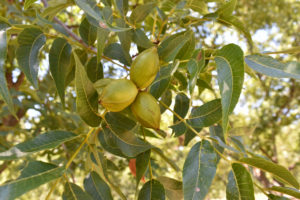
3SA for Veterans prepares for its first harvest. Veterans will be shaking trees, collecting the crop, and running it through the cleaning plant this fall. (Photo by Catherine Clark)
“During harvest time, we’ll be hiring people in town who want to come out and earn a little buck,” Ewing says. “We’ll say, ‘Hey, come on out! We’re here.’ The place is relatively clean. We’ll have enough to eat so that you can function. We’ve got propane heaters and will provide them with gloves. It won’t be a difficult job, just something to get done.”
The nonprofit has big plans for Olsak’s orchard. Many of those plans involve making the orchard more self-sustaining. 3SA for Veterans is partnering with Eco-Drip to install micro-drip irrigation systems to replace the traditional flood irrigation system. Additionally, they plan to install solar panels onto the roof of the cleaning plant to power the irrigation system and eventually the entire property.
“As gerontologists, we are environmentally friendly. We want to make the best use of the water so we can increase as we extend the orchard out,” Sanders explains. “We don’t want to use any extra water, but we want to be grandfathered in to plant more trees. That way, we’ll have more veterans planting trees; more veterans to care for the trees, and we can provide more services.”
That effort to be more sustainable extends to using every part of the tree they can. Recently, the group acquired a wood chipper; one of the vets who has been working on the property is just “itching to make pecan chips.” Sanders says this one tool is going to give them another opportunity to serve servicemembers.
“How many people like to cook with pecan wood? We are going to be bagging pecan wood and selling it through the hardware store and grocery stores. That creates another business for veterans to start earning money for themselves. All that just because we were able to raise enough to get that machine,” he adds.
3SA for Veterans plans to make the orchard more sustainable, acquire new equipment, and even build homes for veterans, but these plans all depend on one thing: fundraising. Fundraising is the nonprofit’s greatest challenge, and the COVID-19 pandemic has only made it more difficult. The pandemic has not only prevented 3SA for Veterans from hosting fundraising events or attending local get-togethers, but it also has made potential donors afraid and financially uncertain.
“So the veterans that already were suffering, they’re even further down the priority list because nobody knows how long this virus is going to last or what its lasting impact is going to be,” Sanders says.
Throughout this uncertainty, 3SA for Veterans continues to push forward to support those vets in need. They’ve gotten into cattle while prices are down; some of the veterans they work with bought cattle themselves. 3SA for Veterans will raise the cattle on the pastures next to the orchard, and the cooperative will split meat and profits once they sell. The organization is also receiving a donation of three female bison in November; they’ll eventually breed cattle with these bison to produce beefalo or beefson.
Although the charity will be expanding into these other production opportunities, pecans remain their top priority, especially as harvest inches closer. The orchard represents their greatest hope for helping more veterans in the future.
“Based on the amount of donations we’ve raised, we’re going to buy a house or two out here so Charles [Ewing] doesn’t have to commute from San Angelo. We’re going to have a house or two on the northside of San Angelo for vets to live in and work the trees and the animals,” Sanders shares.
And their greatest dream? To build a house on the orchard property itself. A triangular patch of land sits between two blocks of mature pecan trees. It’s the perfect space for a farmhouse and a home for veterans.
“We know nobody can succeed on their own. It’s building a village, bringing the community together so that we can all succeed,” Sanders says.
Until that dream becomes a reality, 3SA for Veterans continues to fight every day for every veteran. This pecan orchard marks just one step forward. As they prepare for their first pecan harvest, Charles Ewing repeats this mantra: “We’ll start slow and keep going.”
If you’d like to help out or learn more about 3SA4Veterans, you can reach them at 325-213-5365 or 3sa4veterans@gmail.com.

